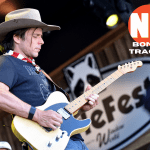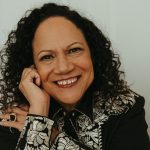Steve Earle and David Broza Open the 2014 Woodstock Film Festival
“East Jerusalem / West Jerusalem” at Woodstock
Steve Earle and David Broza collaborate on a music project for art and peace
Last night in Woodstock, New York, the 15th annual Woodstock Film Festival kicked off with a screening of the documentary East Jerusalem/West Jerusalem (2014), and a brief post-screening concert by two of the musicians featured in the movie, Steve Earle and David Broza. In a place whose name is more associated with music than any other, perhaps, in America, the movie was an excellent beginning to a film festival in Guitar Town.
I’ve been an Earle girl since a guy from Texas sat me down and had me watch Heartworn Highways (1976), the still hard-to-find James Szalapski music documentary featuring Earle, Rodney Crowell, Guy Clark, and Townes Van Zandt. To say the movie is a classic is not to do it enough justice. Earle’s performances as a skinny, handsome kid with sad dark eyes and flashing fingers, especially that of “Mercenary Song,” still drop me like an anvil.
Nearly forty years later, Earle is one of America’s finest, and most articulate, singer-songwriters. Never one to shrink from controversy — indeed, he seems to welcome it — he is quick to speak on politics and prose, likes and dislikes, world problems and personal matters. But how did Earle come to work on a movie with David Broza of a record being made, in an area of East Jerusalem both men refer to as a refugee camp, among eager children and local musicians both Israeli and Palestinian, with art and song striving to erase frontiers?
“It was Townes Van Zandt, my mentor, who brought us together,” said Earle after the screening. Broza was working with poems and lyrics Van Zandt had given him, setting them to music, to be released on Night Dawn (2010), while Earle was recording his own album Townes (2009). “From beyond the grave,” as Earle put it, Van Zandt gave the two musicians common ground, and they soon found much more. “We did a show together, during that Townes cycle, at Ethical Cultures in New York, and it just went from there.”
Earle’s 2002 album Jerusalem was also relevant to him. When they met, says Earle, “I don’t think David knew my record, Jerusalem” — which he describes, along with The Revolution Starts Now (2004) as his “post-9/11 records,” his attempts to deal with the event. On the title track, Earle sang of a city he had never visited at the time, where the well-known historical and religious sites are “closer together than the places where I shop in my neighborhood in New York City.” He has been to Jerusalem twice with Broza: one trip, for the eight days of filming in a small recording studio in East Jerusalem with Israeli and local Palestinian musicians; and again for Broza’s annual Sunrise Concert at Masada, in August 2014. “I wrote ‘Jerusalem’ without ever having seen it,” said Earle. “David made me an honest man. I thank him for that.”
In its 21st year, the Sunrise Concert was canceled because of the Israel-Gaza conflict — but the musicians played on, with themselves and their friends for an audience, and an internet hookup for the world. Earle wouldn’t have missed it. “I said fuck it, I’m comin,’ and we did the concert for a few friends of David’s, in a mostly empty ampitheater at Masada, with an internet hookup for 45 or 50 minutes. It was half an hour before the sun coming up.” Over one shoulder, recalled Earle, was the Dead Sea and Jordan. Over the other, the ancient fortified cliffs of Masada. He chose to sing “God Is God,” a song he wrote for Joan Baez, with which she often opens concerts; “it was quite an experience to sing it in that place, in the world, at that time.”
Said Broza, “My idea was not to show Israelis and Palestinians can make peace — and I do not know of they will. But we tried.” What he and Earle and the musicians tried to do was, in Broza’s words, more than “just sing about it, talk about it.” He approached the parents in the refugee camp to see if their children could participate in the music. “They were convinced I came from the Secret Service. I went to the car, I got my guitar and I started playing. After that, the camp was ours….” When asked by an audience member after the show why girls were seen with the musicians at the start of the film, but only boys, and predominantly boys, by the end, Broza said he had to go circumspectly through “procedures with the parents before I could speak to the children,” and made the point that the musicians were men. “The next step is to bring women to play music with the girls.” He was spurred to this project by his sadness that “nothing is going on between Israelis and Palestinians in the arts. And that is very bad.” The place he chose to record and film reflected this: the people in the neighborhood, Broza said, “are Jordanian subjects, living in Israel as refugees. After 65 years, still displaced people.” Can art, and music, help to make peace? “Let’s hope.” Funding for a completed cut of East Jerusalem/West Jerusalem, and videos of the 13 songs on the album, is now being raised via indiegogo.com.
Broza concluded the post-screening concert with his best-known song, the peace anthem “Yiyhe Tov (Things Will Get Better).” He sang with passion and conviction, louder, and louder. As he finished, the audience stood and cheered.
Photos of Steve Earle and David Broza via the websites of the artists, and Woodstock FIlm Festival 2014.




